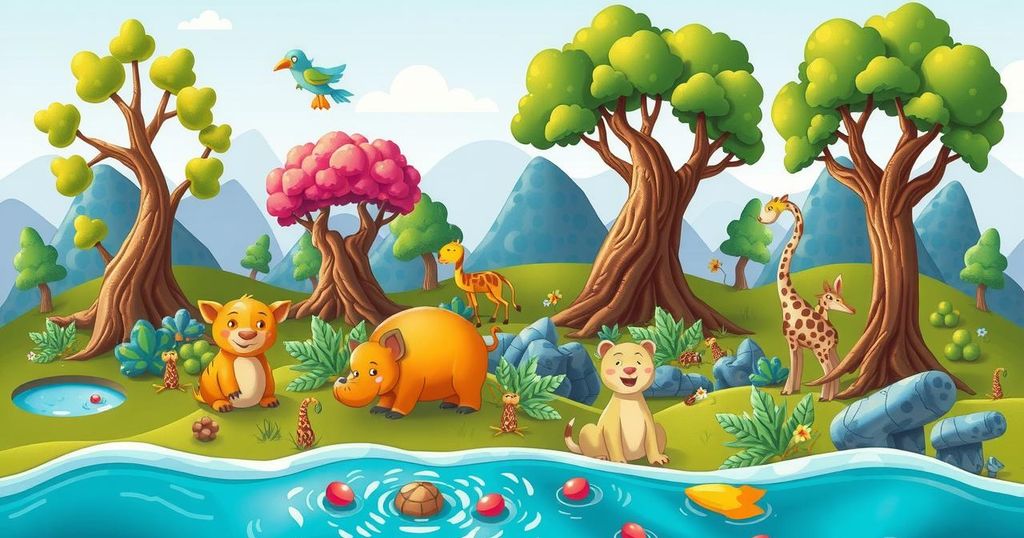This article delves into the bizarre consequences of climate change, highlighting how humor can offer a coping mechanism for environmental anxieties. It discusses peculiar outcomes such as shrinking frogs, rising rat populations, changing food flavors, and impacts on wildlife and technology. The piece promotes using comedy to foster discussion on climate issues and encourages proactive engagement in advocacy efforts.
Addressing the challenges posed by climate change can be daunting; however, employing humor might alleviate some stress. Science suggests that laughter is a coping mechanism that helps reduce anxiety and tension associated with environmental issues. Recognizing this, a list of the most peculiar consequences of global warming serves both as a reminder of our environmental crisis and a means to uplift spirits.
1. A Croaking Chorus: Global warming is causing Puerto Rico’s coquí frogs to shrink, but their mating calls have become louder and higher-pitched, creating a unique and unexpected harmony in nature.
2. Baseballs Are Going, Going… GONE!: A study from 2023 found that warmer air reduces its density, allowing baseballs to travel further. It is predicted that the frequency of home runs could rise by 10% by 2100, enhancing Major League Baseball records.
3. A Condiment Crisis: The agriculture sector is facing challenges due to extreme weather, leading to a chili shortage that impacts the production of hot sauces like Sriracha and even Dijon mustard, showing that climate change affects culinary flavors.
4. City Rats Are Thriving, and We’re Not: Warmer temperatures have led to an increase in rat populations in urban areas. The extended breeding season allows these rodents to thrive while humans contend with climate-related anxieties.
5. Lions & Tigers & … Grolar Bears? Oh My!: Climate change and habitat loss are pushing animals to hybridize, leading to unique species like grolar bears (a mix of grizzly and polar bears) and coywolves (coyote and wolf combinations).
6. The Invasion of the Jellyfish: Jellyfish populations are increasing in the UK and Irish seas due to warmer ocean temperatures, leading to unexpected encounters and potential risks for swimmers.
7. Beware of Shark-Infested Waters: Rising sea temperatures are pushing sharks into new habitats, potentially increasing shark attacks in previously safer regions. While ocean swimming remains safe, this phenomenon may heighten anxieties for beachgoers.
8. Withering Wine Grapes: Extreme weather conditions are altering the taste of wine grapes, leading to grapes that taste unusually sweet. Wine enthusiasts may find their favorite varieties transformed in taste due to climate change.
9. Satellites Are Speeding Up: The contraction of the thermosphere, driven by carbon emissions, reduces drag on satellites. This increased speed could lead to more collisions and hinder technological services such as GPS and television broadcasts.
10. Aquatic Anosmia: Ocean acidification is impairing fish’s sense of smell, making it difficult for them to navigate, find food, and escape predators. With rising carbon dioxide levels, aquatic life faces severe challenges in survival.
11. Who Dimmed the Lights?: Increasing sea temperatures are reducing cloud cover and reflecting fewer sunlight rays back into space. The result is that more heat becomes trapped in the atmosphere, exacerbating climate change and dimming the planet’s brightness.
12. Bless You!: The pollen season has lengthened considerably due to longer springs; between 1990 and 2018, it increased by 21%. Individuals with allergies are likely to experience intensified symptoms as a result.
13. Mummy-Hungry Bacteria: Humidity-loving bacteria are causing the deterioration of ancient Chinchorro mummies in South America, illustrating that climate change impacts even the remnants of history.
14. Trees Are Growing Faster (But That’s Not Necessarily a Good Thing): Increased carbon dioxide and warmer seasons have accelerated the growth of some European forests by 70%. While beneficial for paper industries, this rapid growth can disrupt ecological balance.
In conclusion, humor serves as a vital tool for addressing the pressing issues of climate change. By highlighting the absurd consequences of global warming, we can foster engagement and awareness around this critical topic. The use of comedy can facilitate conversations about urgent environmental concerns, encouraging individuals to participate in climate advocacy. Through initiatives such as Earth Action Day Roundtable activities, individuals are invited to make a positive impact on the environment and combat climate change effectively.
In summary, while climate change elicits serious concerns, recognizing its bizarre implications through humor allows for a lighter perspective. From changing wildlife behaviors to unexpected consequences impacting everyday life, these peculiar effects are reminders of the ongoing environmental crisis. Utilizing humor can foster more engaged conversations and encourage proactive steps toward climate advocacy. Together, we can address these challenges while maintaining a sense of hope and community action to combat climate change.
Original Source: www.earthday.org






